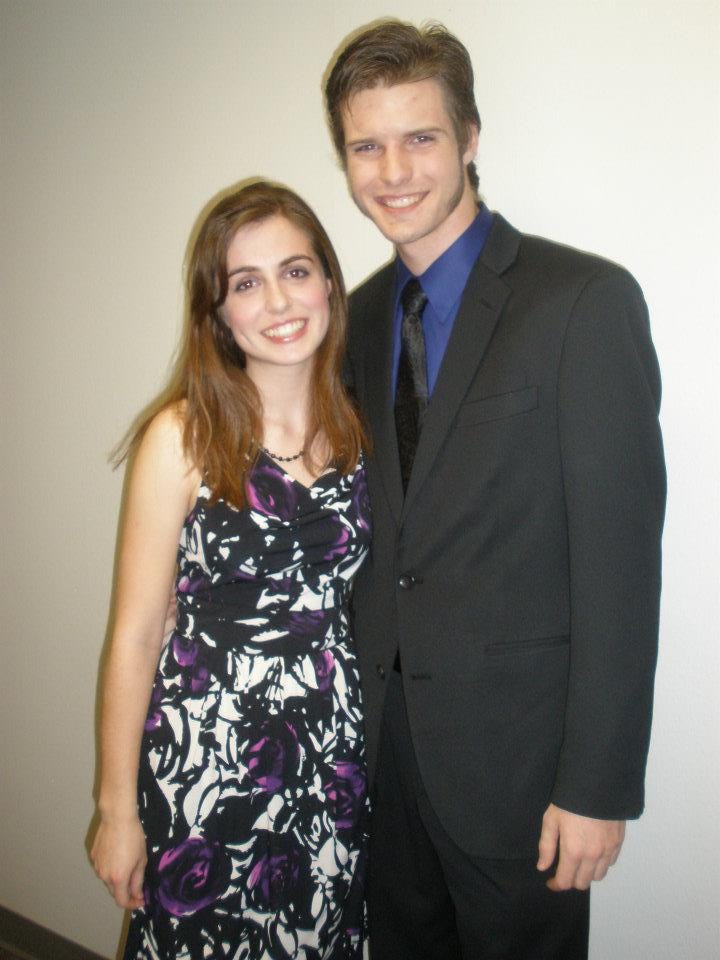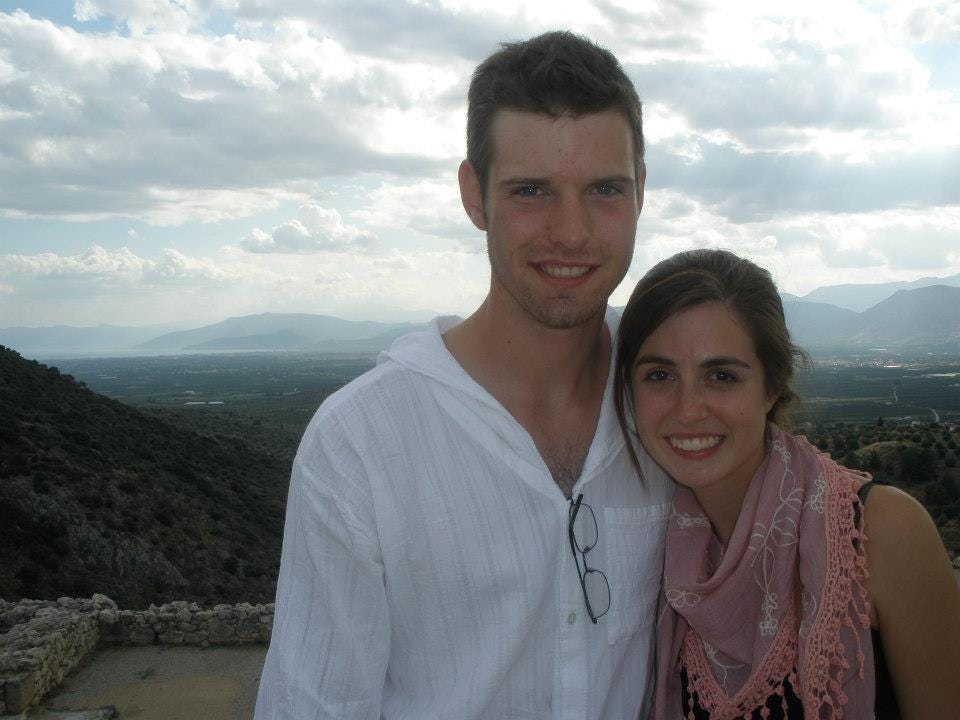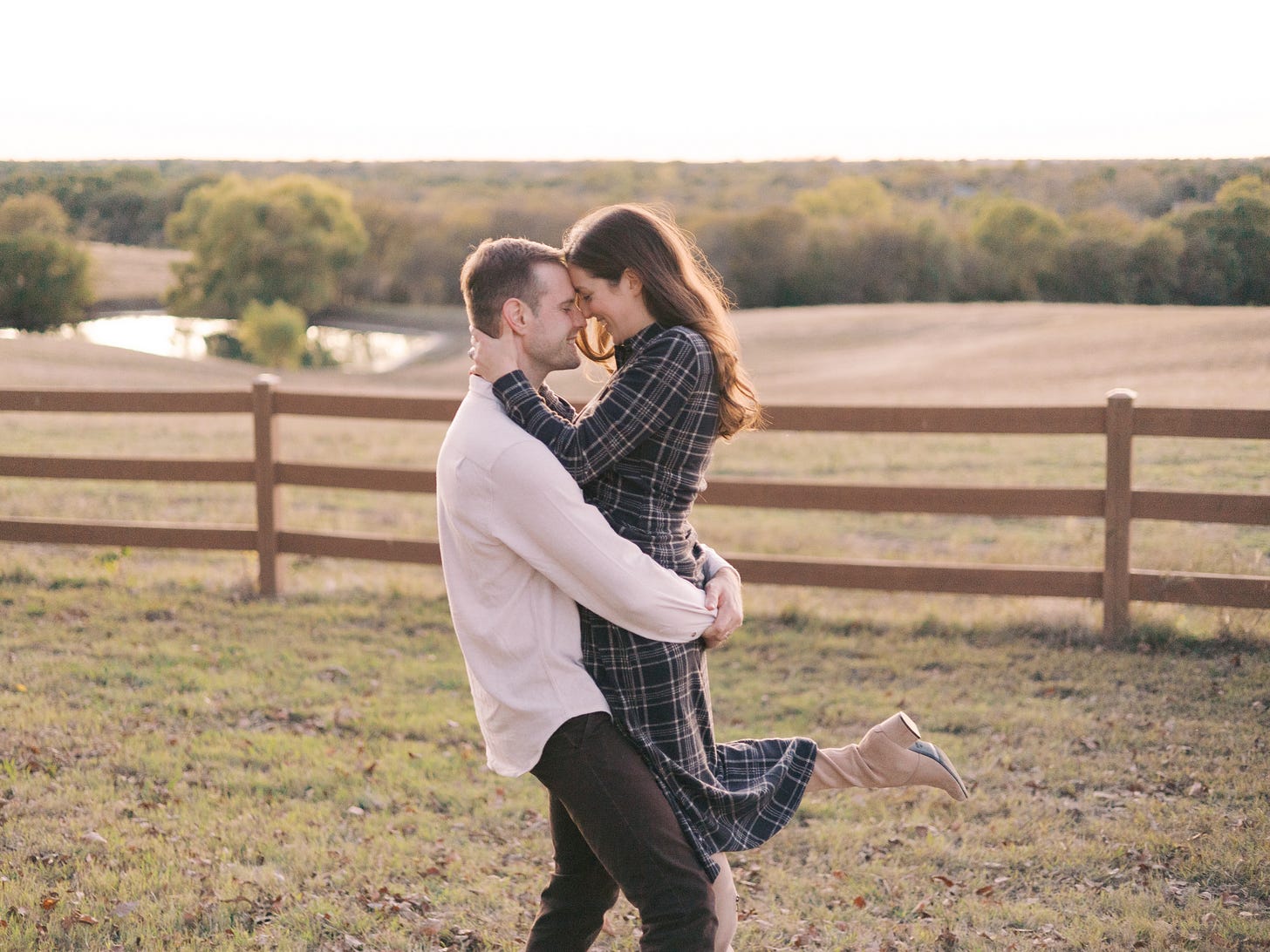On the Choices We Made When We Were Too Young
Looking back on 13 years
The Distracted Writer is a newsletter founded on the conviction that my “distractions” from writing can often be my greatest sources of inspiration. It includes book recommendations; insights into writing, publishing, and parenting; and original pieces of creative fiction and nonfiction. I’m Alexa T. Dodd (hi!), an award-winning author and mother to three amazing boys. Thank you for reading!
You were seventeen, with unruly dark hair and the jawline of a 1950s movie star, and you sat in the row in front of me during the orientation seminar. The girl beside you asked you something and you smiled at her warmly and I suppressed the longing, like jealousy, that sparked inside my chest, for you did not belong to me. Not yet.
You were the male lead in a Shakespeare play, heartsick and overwrought on the ground of the blackbox theatre, and I went to that play three times—slogging through its meandering three hours—just to glimpse you professing your fictional love for a woman who wouldn’t love you back. And I barely admitted to myself that I imagined you thinking of me to help you access those particular emotions of longing.
You were the heartbeat drumming into my throat that whole winter break, when I’d open the messaging feature on Facebook (you didn’t have texting) and pray you’d responded already to our long and winding conversation about nothing. On Christmas morning, while some family drama shattered the peace of gift opening, I sent you a “Merry Christmas,” hardly knowing that already I was imagining you into a life in which Christmas morning could be something that answered all those longings for peace on earth and joy to the world.
(When you didn’t respond—because you were celebrating with your own family in their happy chaos—I stored away that failed expectation like a haggard winter coat I could put on as I waded, time and time again, into the cold premonitions of our failure. Proof that I should have never trusted you to start with. And thirteen years later, when we are married with three children, I remind you of those silly words on our computer screens and the disappointment of that Christmas, and you laugh and say you’re sorry, you hadn’t known, back then, how much I needed you to mean. On the most recent Christmas morning, we watch our children play with Legos and you hold me on the couch and I cannot even express the goodness of it, for it is the answer to a prayer I had barely let myself pray.)
You came up behind me, your timing miraculous, as my boot skidded on a tile floor slick with rain water, and I would have slipped onto my back if you hadn’t caught me, your steadying hand to the small of my back. “It was just a coincidence that he was there,” I told my mom later, and she answered in her Latina Catholic way that there are no such things as coincidences.
You wore a black, polyester suit and I my old homecoming dress and we were playing at adulthood, invading the Anatole Hotel with our awkward and eager friends, and we snuck away to the piano in an empty ballroom and you made up the song on the spot, your long hands—the callouses and the shape of your fingers already becoming familiar—moving with ease over black and white. I leaned my head on your shoulder and you told me you loved me, the words like an exhale you had been holding back for years, but it had only been two weeks, two weeks since you’d asked me out at a different piano in a drafty dorm lounge and all the months of my longing had boiled down to a simple, naive yes. And now I was speechless. When the silence stretched too long, you casually suggested we rejoin our friends.

(I don’t regret that I did not say it back that day, that I waited several weeks more, until I could say it with all the conviction of my diplomatic yet melodramatic eighteen years. How strange that those words could feel so heavy with self-abandon, so decisive yet fragile when now we say it everyday in a thousand ways—silly and reprimanding and intentional and spontaneous and, more often than not, wordlessly, in the sleep-deprived acts of selflessness that make up our days.)
You sang too loudly, and sometimes off-key, in the crowded cafeteria or on public sidewalks, and I would tug on your arm and beg you to stop, please, people are looking, our friends are looking. I worried, if we stayed together, that you would embarrass me for the rest of my life. Now, I can only hope you still find little ways to embarrass me well into our old age.
You were sun-tanned and earnest on a boat between Greece and Italy, and we were surrounded by our classmates and a hundred other travelers as we had been for months and this time the claustrophobia of it was too much. We were too young and too dramatic and too ill-adept at finding words that could speak truth without hurting the other person and I thought it was over. Though we made up, though we trudged through that whole semester abroad with our relationship intact, I didn’t think we would make it to our first anniversary of dating. At the end of that semester, you stayed behind to travel Scotland and England with your roommate, and you had no internet access for two weeks. The whole time, I weighed what I had not said and what I could say and finally had the courage to send you a message you would read on your flight home: “I’m sorry I didn’t say I’d miss you when we said goodbye. Because I do.”
You were patient and silent through countless evenings when I was unaware that the angst and uncertainty I battled week after week had more to do with my own anxiety than with us. You listened as I started a dozen sentences with, “It’s just…” and couldn’t finish them because I was too afraid to say how I really felt, because I was sure it would drive you away. And then when I finally found the courage to speak, you stayed and didn’t belittle the depth of my feelings.
(We joke about this now, the torture of hearing me start a sentence with “It’s just…” and the hours it used to take for me to say what I needed to say. Now, we bring up issues before they become arguments. In the early days of our marriage, when I was afraid the “honeymoon-phase” was ending, you would make “State of the Marriage Addresses” in which you’d adopt your best presidential impression to list all the successes and healthy marks of our marriage. Even now, when you say the exact right thing to comfort me, I joke that your teleprompter technician deserves a raise. I wish I could go back in time and tell that college-aged girl not to be so afraid.)
You stayed with me in the rigid chairs of the library third floor, my favorite place to study, when, for hours and hours, I wrote essays on Yeats and Shakespeare and Marilynne Robinson. You stayed with me at parties I didn’t really want to attend, but felt I should, because that was what college students did. You stayed with me and my family in the hospital waiting room, during my mom’s eight hour surgery, when we knew we would not lose her and yet it felt, to me, that I was losing something—my childhood all at once or the presumed unbreakability of a mother. You stayed with me on late Sunday afternoons when I asked if you’d still love me if I was a duck and you stayed with me when I didn’t think our love could last. You stayed.
You got down on one knee and we were twenty-one and twenty-two, too young to make that kind of life-altering choice. The human brain does not fully develop until the age of twenty-five, when the prefrontal cortex reaches the maturity to guide wise choices and plan for the future. But we had been together for four years, which seemed a more than conscientious span of time to choose the person with whom you would spend your life.
(Now, four years feels like nothing at all, and twenty-three seems the age of children. Your face in our wedding photos is so young, more like the boy I met in college than the man who is now the father of my children. Was it wisdom or luck or grace that led us here, that made you the right choice from the very beginning? Our lives are shaped by the choices we make, and it seems a miracle we kept making the right one.)
You are my husband, and you make mistakes as often as I do. You forget to put away pot roasts and decide to do lawn work one hour before we host a party. I spend too much money on books and become a volatile mess when I’m hungry. We both sneak time to scroll on our phones instead of cleaning the house. When I read about marriages that fall apart, I score the sentences for clues on how to keep ours alive. Most often, they speak of the unequal distribution of domestic labor and the toll of childrearing and waking up one day and realizing your spouse is someone you don’t know, someone you can’t imagine spending your final years beside. I fear less the drastic, world-shattering choices—affairs and betrayals—and more the tiny, day by day decisions that toll into decades of resentment. But if we can remember that the small choices are what matter, perhaps we have more power than we think.
You are the man I tell, late at night when the kids have gone to bed, that I fear I am failing at everything I set out to do. I fear that all the choices I make in a given day are the wrong ones, and that I will leave in our children’s hearts indelible marks, wounds that will one day cause them to stumble and to fear the commitments that can make their lives beautiful. And you say, of course we will fail. We will try our hardest and there will still be things we could have done better. We can never truly know, in this life, the repercussions of all our decisions. But the hope of the next life—of the eternity we believe in—is that we will see one another in our fullness, in the light of all the decisions we have made and all the ways we have tried, and we will understand. We will forgive our parents and forgive ourselves and we will love one another the way God loves.
And in that moment, I understand, as I have again and again these past thirteen years, that making you mine and being yours was the best choice I ever made.
(As I drift off to sleep, I tell you that your teleprompter is really on point tonight.)
PS. Thank you, as always, for reading! I’ve been thinking about this post for awhile, but struggled to find a way into it. I was worried it was too saccharine, too personal. I worried people who don’t know me wouldn’t care and people who know me and my husband would (lovingly) roll their eyes at my sentimentality. But when I finally sat down to write, I realized it was more than the story of my college sweetheart. It was a story about growing up, about tolling together all the moments, good and bad, that have brought us to where we are now and seeing that the sum is even greater than those parts. It’s about being in my thirties and knowing I’m still quite young but recognizing that I’m old enough to reflect on the choices I’ve made thus far. It’s about questioning the rationality of those decisions, even if I wouldn’t change them for the world. It’s about loving who I was then, which is another way of accepting who I am now.
In that sense, I hope these words resonate with each of you.





Alexa, this is one of my favorite things you've written. What a powerful tribute to your husband, your marriage, to everlasting love. I love the way you formatted this essay, all the stories and their lessons, most of which made me bleary-eyed because you tell them so beautifully. Thank you for being vulnerable and, through your vulnerability, crafting a heartfelt, inspiring and very real piece on marriage. <3 happy 13 years, by the way!
Hey Alexa!! I always enjoy reading your work! You are wise beyond your years!! Love,
Aunt Anita